
Brazil’s Finance Minister Fernando Haddad is confidently projecting that his proposed austerity measures will survive the congressional gauntlet largely intact. The Brazilian government is grappling with the dual challenges of curtailing fiscal deficits while attempting to enhance economic stability amid pressing financial strains.
Haddad, who has been proactive in discussing the intricacies of the austerity plan, emphasized the necessity of these measures during a recent forum in São Paulo. He relayed that the current discussions in Congress have been largely favorable, with stakeholders recognizing the urgency of fiscal discipline as essential for sustainable economic growth.
With inflationary tendencies from previous administrations still impacting Brazil’s economy, Haddad’s proposals aim to implement measures designed to rein in public spending and solidify a path toward fiscal prudence. His strategy focuses not only on alleviating immediate financial pressures but also on laying the groundwork for long-term economic health.
However, Haddad's optimism is set against a backdrop of a politically charged environment. The Brazilian Congress is known for its dynamic and often unpredictable nature, raising questions about the viability of implementing such stringent policies. Legislators who are wary of public opinion and the potential backlash from constituents may further complicate the passage of the austerity plan.
Despite these hurdles, Haddad remains steadfast in his belief that key aspects of the plan will prevail in Congress, hoping it can garner broad support from both sides of the political aisle. He pointed out that several influential factions within the government appear amenable to the proposed adjustments, which aim to cut non-essential spending and streamline government functions.
In addressing concerns regarding social implications of austerity, Haddad reiterated the administration's commitment to maintaining essential public services. He commented that the function of these fiscal policies is not merely to slash budgets but to facilitate growth-oriented investments that would ultimately benefit Brazil's citizens.
Political analysts speculate that while there might be some resistance from members of Congress who prioritize different aspects of governance, the broader consensus on the importance of stabilizing Brazil’s economy could pave the way for a smoother passage of the austerity measures. Haddad's perspective reflects a calculated optimism, urging that with strategic communication and ongoing negotiation, the proposed changes can be enacted effectively.
The legislative trajectory of Haddad’s austerity plan will be one to watch closely in the coming months, with potential implications that could reverberate through Brazil’s economy for years to come. The focus now shifts to Congress as it debates the necessary adjustments to ensure fiscal reforms are both effective and equitable.
Ultimately, the passage of Haddad's plan may not only influence Brazil's immediate economic outlook but also signify a turning point in the country's approach to fiscal governance and public spending.
#Brazil #Austerity #FinanceMinistry #EconomicPolicy #FernandoHaddad #FiscalDiscipline #Congress #PublicFinance #SaoPaulo
Author: Rachel Greene




